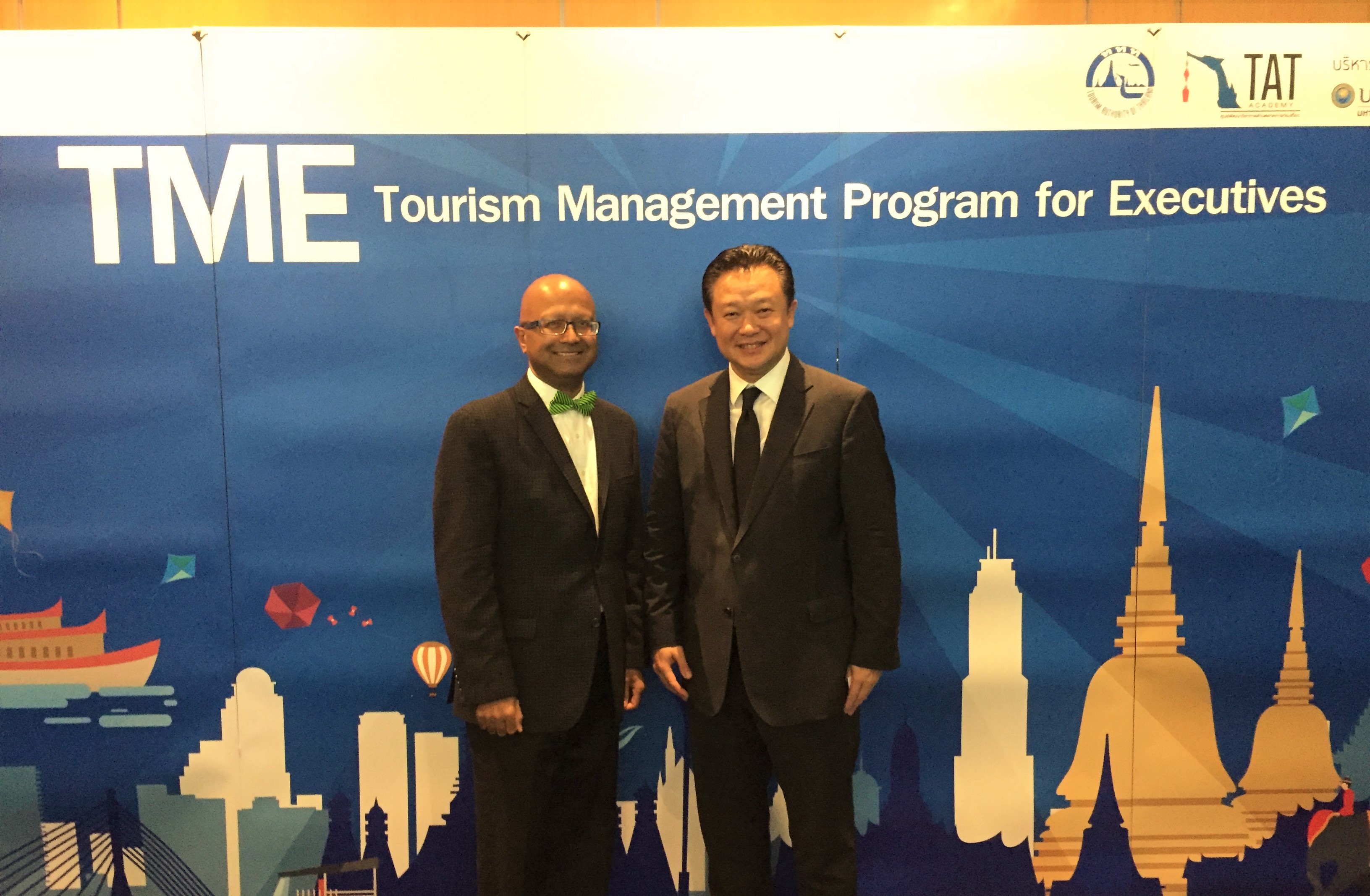
Dipra Jha, assistant professor of practice in Hospitality, Restaurant and Tourism Management, recently traveled to Bangkok, Thailand to conduct a workshop for tourism executives in that country. Jha’s presentation was part of a professional development series called Tourism Management Program for Executives (TME), jointly administered by the Tourism Authority of Thailand (TAT) and the University of the Thai Chamber of Commerce (UTCC) Business School. The event held on February 15th at the Renaissance Hotel Bangkok was attended by executives from the hospitality and tourism sectors, senior government officials and university faculty.
Jha was invited to present on the tourism S-Curve, a model proposed by Butler (1980) that explains how tourism destinations go through a cycle of discovery, growth, success and stagnation over time and then experience either decline or rejuvenation. Citing examples and case studies from around the world, including work he has done for communities such as Nebraska City, Jha argued that an experience-based strategy would be more effective than a service-based model, for countries and communities to grow and sustain themselves as attractive destinations. Contextualizing the tourism S-Curve for Thailand, Jha alluded to the country’s new 20-Year National Strategy and the Thailand 4.0 policy, which the government plans to achieve by reforming existing “First S-Curve” industries - agriculture, food, affluent, medical and wellness tourism – and promoting “New S-Curve” industries like aviation and logistics. He highlighted synergistic relationships between Thailand’s “First S-Curve” and “New S-Curve” industries that could benefit tourism in the country and referenced agro-tourism examples from Nebraska and Napa Valley, where agriculture, food and logistics come together to deliver unique destination experiences.
"The Tourism Management Program for Executives is an important professional development opportunity for tourism and hospitality leaders in Thailand," said Dr. Thanathorn Vajirakachorn, head of the Department of Tourism Management at University of the Thai Chamber of Commerce (UTCC) Business School. "It is part of the Thailand 4.0 national strategy and aims to revitalize the sector by bringing in executives from across the country for high-level interactions with tourism experts. Participants were able to learn a great deal from the presentation delivered by Prof. Dipra Jha. He is a global expert in luxury tourism and with Thailand's current focus on affluent tourism, we are very happy he could be part of our program."
The Kingdom of Thailand is a Southeast Asian nation of 68 million people. It has diverse cultural, religious and culinary traditions and is a popular leisure destination for visitors from Europe and North America. According to the World Travel & Tourism Council, total contribution of tourism to Thailand’s economy was $80 billion or 20.8% of the country’s GDP in 2015. Travel and tourism supported 5.86 million jobs or 15.4% of total national employment for the same year. Established in 1960, the Tourism Authority of Thailand (TAT) is a public-sector organization responsible for promotion of tourism in the country. With 35 offices nationally, TAT collects and disseminates tourism data and markets Thailand to domestic as well as international visitors. It is responsible for long-range tourism planning and human capital development to meet the needs of the hospitality and tourism sectors. TAT’s international outreach includes offices in New York City, Los Angeles and Toronto.
"I very much enjoyed Prof. Dipra's presentation about tourism S-Curve and how it can be used to improve hospitality," commented Bhuritt Maswongssa, president, Tourism Council of Phuket. "As someone managing a resort in Phuket, Thailand's tourism capital, I took away a lot of important information from this workshop and even asked some follow-up questions to Prof. Dipra after his lecture."
Since the workshop, Maswongssa has reached out to Jha with an invitation to conduct a similar workshop for resort industry executives in Phuket later this year. Located off of the west coast of Thailand in the Andaman Sea, the island of Phuket is one of the most recognized resort destinations in the world.
During his stay in Bangkok, Jha was also invited to present a workshop on instructional excellence at the University of the Thai Chamber of Commerce (UTCC). Originating in 1940, UTCC is one of Thailand’s pre-eminent institutions of higher education. Organized into eight schools: Business, Accountancy, Economics, Humanities, Science, Communication Arts, Engineering, and Law, the University currently enrolls 20,000 students. Degree programs are offered both in English and Thai, up to the doctoral level. UTCC has strong ties to entrepreneurs in Thailand through its founding body, the Thai Chamber of Commerce. Jha’s session on digital learning received positive feedback from participants and he also had the opportunity to meet UTCC President Dr. Sauwanee Thairungroj.
Tourism is Nebraska’s third largest earner of revenue from outside the state after agriculture and manufacturing; bringing in excess of $4.7 billion annually and supporting 46,200 jobs. According to the U.S. Travel Association, tax revenues generated by domestic and international travelers in Nebraska in 2015 totaled over $667 million. Hospitality, Restaurant and Tourism Management is one of the fastest growing majors at UNL and resides jointly in the College of Education and Human Sciences and the College of Agricultural Sciences and Natural Resources.